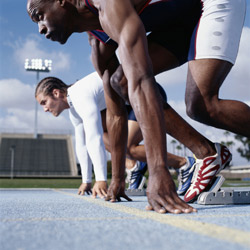Runners Knee

Anyone can experience this knee pain but it is most commonly associated with runners due to the repetitive nature of their sport.
Patellofemoral Pain Syndrome
Runners Knee is also known as Patellofemoral Pain Syndrome. Anyone can experience this knee pain but it is most commonly associated with runners due to the repetitive nature of their sport.
Symptoms:
Pain around the kneecap or patella is the most common symptom. The pain can be described as under the knee cap, or any direction of proximity to it. Running or other activities tend to be aggravating if you continue through the pain. Pain around the knee cap is also common after prolonged sitting. The pain can begin as a dull ache and progress to a sharper stabbing pain.
Causes:
As mentioned earlier there are many different causes of Patellofemoral Pain Syndrome. The most basic problem is the mechanics of how the knee cap moves through the groove in which it sits. Too much pressure on the knee cap can cause it to track improperly; causing friction that will result in pain. If part of the quadriceps is weak for any reason a muscle imbalance can occur. This may cause the patella to pull to one side which would place more pressure on the cartilage of the knee.
Studies have shown tight hamstrings to cause knee pain in runners. This may be due to the fact that runners will heel strike with a bent knee which places more pressure on the quadriceps muscles. Weak hip muscles can also cause Patellofemoral Pain Syndrome. Weakness of these muscles leads to improper alignment of the knee which places more stress on the painful structures.
Treatment:
Patients with Runners knee can benefit from 4-6 weeks of manual therapy and exercises. The goal is to initially treat the pain and inflammation, and then to correct the muscle imbalances to improve the function of the knee. Myofascial release/active release is very effective for this problem and should be combined with other therapies such as acupuncture, ice, active rest and functional exercises.
Give our Waterloo chiropractic office a call to schedule an appointment and see how we can help you or someone you know.
